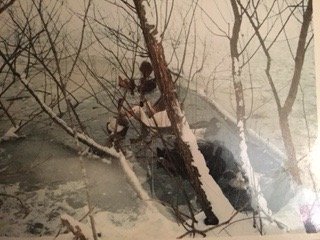The Hard Edge of Winter
Recent reports of ice and blinding blizzard conditions on the east coast and in the upper Midwest remind me a drama that took place winters ago on the pond at Breakfast Creek. One morning when I went down to feed our ducks and geese, I came upon a great blue heron lost in dreams of soft water. We had both come to a spot along the western edge of the pond that was the last edge to freeze in the night. The heron had seen our flock of geese and ducks, then landed next to them by an opening in the ice. But sometime in the night, the mischievous old moon had reached out its icy fingers and pulled the pond's zipper tight, leaving them all to deal with the frozen elements on the coldest night they’d known that winter.
That night, winter showed its mean streak and made the heron’s search for food hard. Made everything hard, most of all the pond itself. To stay warm, the heron reduced itself by half. Facing rearward, the solitary fisher bird had periscoped its neck down into itself and tightly tucked its great head and bill into the downy warmth of its own wing. By morning, all that appeared to remain of the fisher bird was a cold blue shadow balanced on a single stick frozen fast onto the ice.
The heron had rendered himself invisible and drifted into a deep sleep. Perhaps he was remembering the soft feeling of warm water against his long, spidery legs, and the silken feeling of pond muck between the digits of his thin, birdlike feet. In that dreamy warm-water port, he floated through the frigid hours until dawn and was still a thousand miles away when I stepped out onto the ice.
At that instant, the steel blue shadow that had appeared to be a stick frozen to the ice lifted upward with the drama of Arthur's Excaliber emerging from the stone that had held it captive for mythical ages. In the flash of a second, we saw each other and were both amazed. I’d never witnessed a heron's movements from so close a distance. As the great bird awoke, his long spindly legs slowly unfolded and he arched his long neck back out from his shoulders. Finally, in the curious posture of heron flight, he lifted upward with the quiet power and grace of a Concorde jet, banked slightly westward, and flew off into the cold morning.
That winter, only four of the original gaggle of twelve geese remained. Each winter I’d lost a goose to either predators or stress related to some trauma they’d experienced. Their naturally aggressive nature had led me to feel confident about their ability to protect themselves. But Winter was about to remind me of just how hard living in the wild can be.
Later that morning, I walked back to the pond to see if I needed to widen the opening on the ice for the ducks and geese. After testing my weight on the ice, I inched toward the opening and pounded at its edges with a shovel, sending the nervous cluster of geese and ducks scrambling for safety on the ice—all except for my favorite goose Ella who seemed to be sleeping.
To my considerable alarm, I saw that she was bobbing up and down among the ice chunks that congested the tiny opening. Stepping cautiously out onto the ice, I reached into the freezing cold water until my arm had a hold of Ella's underbelly. There was no resistance, a certain sign that she too understood the gravity of her own situation. Her body had stopped producing the critical oils that make her feathers buoyant in water and maintain her body's warmth in freezing temperatures. Ella was literally freezing to death.
Within minutes I’d scooped her out of the water and wrapped her in a large towel. For the next week, Ella slept peacefully in our sunroom on a bed of golden straw next to a bucket of water and a pan of cracked corn. I checked on her often, accompanied by our curious Russian Blue cats Kashmir and Jammu.
When she began to revive, I carried her to our marble bathtub in the guest bedroom and stood her in warm water. After a few days of this routine, she began preening and splashing water on her back. Finally, with her neck craned backward, she instinctively spread the oil that was now flowing again from a tiny hole in her back until she’d coated her feathers.
When it was finally time to return Ella to the pond, the other geese were ecstatic. I can only imagine the stories she told them of the day the pond froze over, and the warm water she bathed in when she was luxuriating in a marble bathtub up in the big limestone house at Breakfast Creek.






